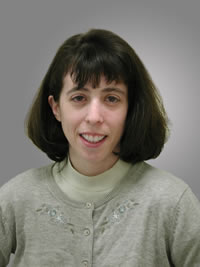Cheryl S. Rosenfeld, PhD, DVM
Associate Professor of Biomedical SciencesUniversity of Missouri
Columbia, MO 65211
Title: “Discovery of a Seminal Fluid Microbiome and How it Might Influence Health of the Male and His Offspring”

Teaching:
BMS 5502 and 5503 Veterinary Microanatomy
BMS 5508 Veterinary Pharmacology (Reproductive Pharmacology lectures in this course)
Rosenfeld specializes in studying the effects of maternal diet on offspring, exploring how the in-utero environment can shape risks for later disease. Her research with mice has yielded majorbreakthroughs. She has determined that an energy-rich maternal diet will result in more male mouse pups, while a restricted-calorie diet produces daughtersmore frequently. She also established a relationship between a certain hair-coat color and obesity and diabetes in mice. Most recently, the Rosenfeld lab has identified spatial learning disabilities in male deer mice whose mothers consumed a diet supplemented with bisphenol A, (BPA), a known endocrine disruptor and a common pollutant. This disability is expected to hinder themales in navigating to find mates; the finding has implications for deer mice populations exposed to BPA in the wild.
Selected Publication
Rosenfeld CS, Murray AM, Simmer G, Hufford MG, Smith MF, Spears N, Lubahn DB Gonadotropin Induction of Ovulation and Corpus Luteum Formation in Young Estrogen Receptor-a Knockout MIce. Biol Reprod 2000; 62:599-605.
Yellayi S, Teuscher C, Woods J, Welsh TH Jr, Tung KSK, Nakai M, Rosenfeld CS, Lubahn DB, Cooke PS Normal development of thymus in male and female mice requires estrogen/estrogen receptor-a signaling pathway. Endocrine 2000; 12:207-213.
Rosenfeld CS, Cooke PS, Welsh TH, Simmer G, Hufford MG, Hess RA, Lubahn DB The differential fate of the mesonephric tubular-derived efferent ductules in estrogen receptor-a knockout versus wild-type female mice. Endocrinology 2000; 141:3792-3798.
Schatten H, Wiedemeier AM, Taylor M, Lubahn DB, Greenberg NM, Besch-Williford, Rosenfeld CS, Day JK, Ripple M. Centrosome-centriole abnormalities are markers for abnormal cell divisions and cancer in the transgenic adenocarcinoma mouse prostate (TRAMP) model. Biol Cell 2000; 92:331-340.
Chen X, Rosenfeld CS, Roberts RM, Green JA. An aspartic proteinase expressed in the yolk sac and neonatal stomach of the mouse. Biol Reprod 2001; 65:1092-1101.
Rosenfeld CS, Roberts RM, Lubahn DB. Estrogen receptor and aromatase deficient mice provide insight into the roles of estrogen within the ovary and uterus. Molecul Reprod Develop 2001; 59:336-346.
Rosenfeld CS, Roberts RM, Lubahn DB. Intraovarian actions of oestrogen. Reproduction 2001; 122:215-226.
Manikkam M, Bao B, Rosenfeld CS, Yuan X, Salfen BE, Calder MD, Youngquist RS, Keisler DH, Lubahn DB, Garverick HA. Expression of the bovine oestrogen receptor-b (bERb) messenger ribonucleic acid (mRNA) during the first ovarian follicular wave and lack of change in the expression of bERb mRNA of second wave follicles after LH infusion in cows. Anim Reprod Sci 2001; 67:159-169.
Rosenfeld CS, Han C-S, Alexenko AA, Spencer TE, Roberts RM. Expression of interferon receptor subunits, IFNAR1 and IFNAR2, in the ovine uterus. Biol Reprod 2002; 67: 847-853.
Akingbemi BT, Ge R, Rosenfeld CS, Newton LG, Hardy DO, Catterall JF, Lubahn DB, Korach KS, Hardy MP. Estrogen receptor-a gene deficiency enhances androgen biosynthesis in the mouse Leydig cell. Endocrinology 2003; 144:84-93.
Roberts RM, Ezashi T, Rosenfeld CS, Kubish HM. The interferon-t: evolution of the genes and their promoters, and maternal- trophoblast interactions in control of their expression. 2003; Reproduction 61:239-251.
Rosenfeld CS, Grimm KM, Livingston KA, Brokman AM, Lamberson WR, Roberts RM. Interaction between maternal diet and sex ratio of offspring, Proc Natl Acad Sci. USA. 2003; 100:4628-4632.
